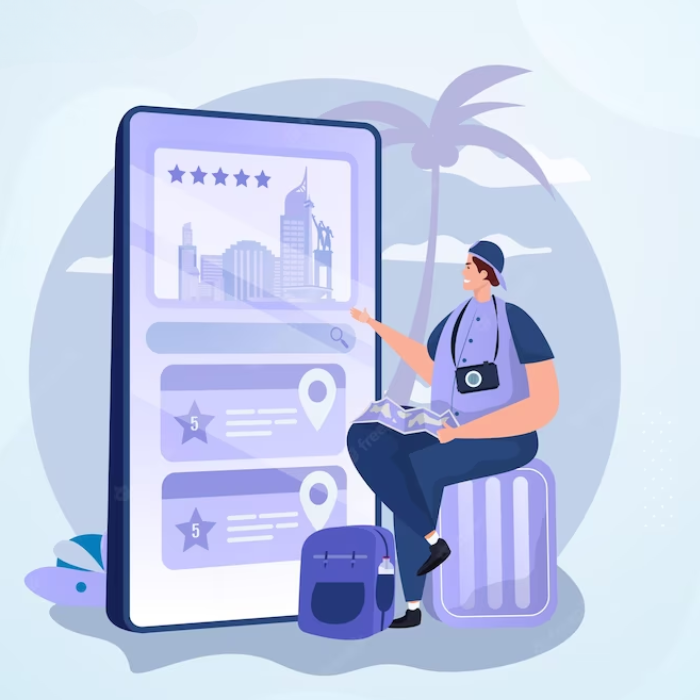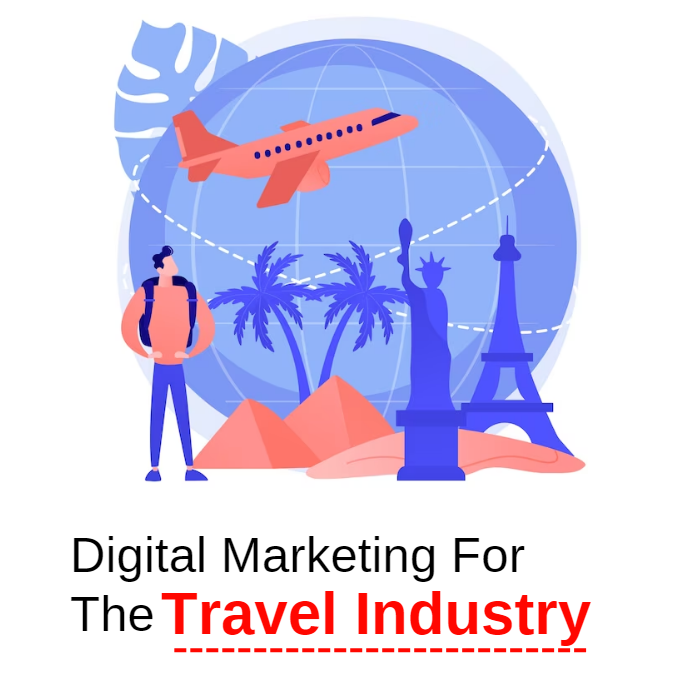
Innovative Digital marketing For The Travel Industry
There is no doubt that Digital Marketing for the travel industry is employed by a wide range of organizations and has proven to be effective in increasing lead generation. Of course, more leads equate to more business, and more business equates to greater profit. The travel business is no exception, and it has successfully adapted to the realm of the digital world in order to raise brand awareness and reach as many potential customers as possible. In this blog we discuss about benefits of digital marketing in travel industry.
The internet has transformed how we consume information and communicate with one another. Recent advancements in 360-degree photography, Virtual Reality, Augmented Reality, and the rise of travel and cuisine blogs have fundamentally altered our approach to travel.
Modern travellers no longer rely on travel agents or magazine articles to plan their next vacation. Various social media outlets, travel blogs, and other sources provide prospective travellers unique insights and inspiration for various trip destinations, creating a virtual treasure mine for digital marketing. Travellers are using all sorts of digital media, providing digital marketing a wider reach than traditional marketing.
Travel deals and offers can now reach more potential travellers than past marketing methods could. In this post, we will look at Digital Marketing in the Travel Industry and how this industry has used Digital Marketing to increase sales.
The Travel and Tourism Industry
Travelling today is quite distinct from travelling in the past. Do you remember when you were a kid and your parents planned a family trip somewhere and instead of feeling all excited about the trip, you saw them all stressed out and fatigued from all the preparations? The digital world has truly turned the tables and made everything so simple that you can resolve everything with only a few clicks.
The importance of Digital Marketing for organizations has expanded with the introduction of today’s digital age, and the travel industry could not pass up this opportunity. By going online, travel firms can now adopt various activities to get themselves recognized, reach a large number of people all over the world and tell them about exclusive discounts, and post advertisements that will make everyone viewing want to head out and start arranging a holiday. The power of Digital Marketing truly transcends borders, allowing the travel industry to entice people from all over the world to the various places they can visit.
The Benefits of Digital Marketing For The Travel Industry
With the modern world so focused on smartphones and connectivity, digital marketing is practically necessary to ensure your business remains relevant and successful.
The following are some advantages of digital marketing for the travel industry:
Consumer Engagement

Engaging with customers has never been easier in today’s connected society. You may reach out to prospective clients at any time of day or night, from anywhere in the world, and using any device, making it much easier to grasp what they expect before they even inquire about your services. In a market where customers hold the power, having that level of service and loyalty is priceless.
Customer Interest in Travel

Travelling has never been easier or less expensive to plan. Exotic countries and lavish vacations are now available to a much bigger audience than ever before, which is great news for travel professionals.
Furthermore, travel blogs and video blogs have provided a platform for jetsetters to discuss their experiences. Someone looking for travel inspiration can stay at home and watch a tourist go on an adventurous excursion, eat a new meal in an unusual restaurant, or immerse themselves in the most diverse of experiences, giving them ideas for future travel.
Search Engine Results Exposure

Though some seasoned travelers plan their trips with a location in mind, it’s typical to find Google and Yahoo searches for “where is the best place to travel?” As a result, it’s critical for travel industry professionals to invest in search engine optimization and search engine marketing tactics that enhance their search engine results page ranks in order to increase the amount of visitors that interact with their goods and services.
Social Media Activity

Social media has had a direct impact on the contact customers can have with businesses, and businesses now have more opportunities than ever to personalize and customize their experiences. This includes not only responding to complaints and enquiries in a timely manner, but also providing information to prospective consumers before they ask. You may tailor your social media ads to represent the destinations, trip itinerary, and travel offers that are most relevant to their interests, providing them ideas for their next adventure. Social media posts and user-generated material can also show prospective clients the joy that others have had travelling to a specific destination with your organization.
Using Data to Create Personalized Travel Experience
With the rise of big data, marketers can now approach their audiences in a more focused and personalised manner. Customers who connect with your business can now collect and analyse data, allowing you to provide a personalised suggestion and experience based on their interests and questions. You can also uncover tendencies that may have a negative impact on your services, allowing you to provide your consumers with exactly what they want.
Trends in Digital Marketing For The Travel Industry
An effective digital marketing strategy for the travel sector entails more than merely inspiring people to make trip plans and pushing them to purchase travel offers. Finally, the goal is to entice your consumers to return and gain their loyalty so that they will continue to use you for their regular trip planning.
Destination Marketing
Destination marketing is all about appealing travellers to visit a location while also giving the finest travel experience with the least amount of inconvenience. Even for seasoned travellers, being in a new place and unclear about how to get there and around, where to go for critical requirements, what rules or laws must be obeyed, and other practical information is always unsettling. The more comprehensively you can deliver this information to your customers, the more confident they will be in your services.
Booking
Booking travel used to be a chore, but digital technologies have made it much easier. There are still problems in the process, so make sure to provide your consumers with the most streamlined and uncomplicated online booking experience possible. Make sure you include all of the information that your customer may require. This is also an excellent time to use content, video, and other marketing initiatives to deliver relevant information to your customers.
In – Flight Marketing
Even with the most exciting travel plans, the process of getting from one place to another may be stressful. The finest thing you can do as a travel professional for your customer is to reduce their stress and hassle by giving in-flight information about wonderful places to visit, travel bargains, and other destination-specific deals.
Social Media Marketing
Social media marketing initiatives are more vital than ever, with roughly 3 billion active social media users. You’re off to a good start if you already have a social media strategy in place, but it’s critical that you continue to engage with your audience, respond to questions or concerns in a timely manner, and inspire them with destinations, travel itineraries, and other travel ideas to keep them interested in your business. Consistency is also crucial, so make sure to post frequently and on a regular basis to stay on the radar of your prospective and present clients.
Influencer Promotion
Influencer marketing is popular in general, but it is especially beneficial in the travel business. Many bloggers, vloggers, and social media influencers travel and utilize their platforms to share their adventures, providing you with a ready-made audience for potential marketing chances. Working with the right influencers and affiliates enables you to reach that audience and create trust by linking your brand with them.
Before partnering with an influencer, conduct extensive research to ensure you locate one whose beliefs coincide with those of your organization, whose following is large enough, and who has a generally positive reputation among followers. It may take some time, but you will eventually uncover the influencer who is a perfect fit for your company.
Video Marketing
Visuals are an effective marketing tool, especially for tourism. Your consumer can envision themselves in a particular location through pictures, videos, virtual tours, 360-degree views, and other immersive experiences, making them wish to visit there in real. Additionally, before making a booking with a company, visitors seeking for trip planning want to be mesmerized by the media they encounter on the website, thus having captivating visuals keeps visitors interested and searching your site for additional goods and services.
Content Marketing
Media of all kinds are included in content marketing. The main idea of content marketing is that the entire approach uses media to communicate with potential customers. It could include images, videos, virtual tours, and more. Content marketing is one of the more imaginative and enjoyable facets of digital marketing because of its variety. To encourage travelers, you may, for instance, employ list articles or blogs that discuss the greatest nightlife, beaches, attractions, parks, etc. around your region or destination. You could also showcase movies or tours of well-known locations.
Tips for Digital Marketing For The Travel Industry
Digital marketing is expected to contribute around half of the over $1 trillion in annual income generated by the worldwide tourism business. The travel sector is competitive because there is such a large audience and potential profit, therefore travel experts must employ cutting-edge methods and approaches to stand out.
Here are some pointers to help your company stand out:
Focus on the targeted Audience
In any business, focusing on the audience is crucial for marketing success, yet it’s frequently forgotten. Without knowing who you’re attempting to reach, it’s nearly hard to develop a good marketing campaign. This is equally crucial to the travel sector, if not more so. Since the effectiveness of travel marketing depends heavily on the user experience, marketing strategies must be customized for the target market.
Your campaign’s development process begins with determining who your target audience is. Consider the goods and services you provide and the types of customers they are designed to appeal to, such as families, couples, singles, senior citizens, or a wide range. Afterward, you can identify traits that help you create your buyer personal.
- Be precise: For instance, if most of your products are geared towards couples, you may immediately pinpoint which traits to emphasise. These could be people under the age of 30, people without children, recently wed couples, etc.
- Empathise: It’s always beneficial to imagine yourself in the target’s position. Think of yourself as a parent attempting to organise a trip with young children. Which places, such children’s museums, zoos, aquariums, and other kid-friendly places, would provide a wide selection of age-appropriate activities?
Utilize Visuals
Social media is essential, but it’s also competitive. You may take advantage of this in a variety of inventive ways, particularly in photography and film. Travelers can be motivated to book their next trip by viewing images or videos of other people’s adventures that capture the beauty or excitement of an exotic location.
Start Paid Advertising Campaigns.
Direct ad placement is available on platforms including Facebook, Instagram, and Twitter. You can quickly create an account, launch a campaign, and access user interaction data such as reach, engagement, and insights.
From there, you can utilize those data to design and modify your advertising campaigns in order to target a more precise demographic, change the frequency or timing, establish clear objectives, and polish your overall approach.
Identify Key Moments
- An investment of money, time, and extensive planning is necessary for travel. The purchase wasn’t made on a whim. Initial research, cost comparisons, and booking are all extensive and time-consuming processes.
- When creating a marketing strategy, it helps to comprehend the process the customer goes through to arrange a trip. The following steps can be used to summarise it:
- Travellers are on their vacation at this time and are sharing their experiences online. But you have the chance to target them because they might be looking for last-minute excursions, sights, and experiences.
You may adjust your messaging to your clients’ needs by knowing what they are at each stage of the buying process thanks to an understanding of this process. For instance, if you provide tours, you might be able to persuade a client to travel to one of your locations, suggest the best season to visit, demonstrate how simple the booking process is, and give them the option of purchasing tickets while they are already there.

Why The Need to Make Use of Digital Marketing
You may find the answer to this question by simply looking at the person on the bus next to you, up in the middle of the street, or anywhere else. If you do, you’ll notice that the individual sitting next to you is holding a device, LED billboards can be seen in the sky, and more and more people are immersing themselves in technology.
Real data from numerous statistics has revealed that the majority of companies in the travel and tourism sector are performing far better than those who are not. According to a recent research, 3.2 billion people use smartphones worldwide, or around 50% of the world’s population. Imagine catching their eye and letting them know about your trip offers. Isn’t this a terrific starting point for everything?
The travel and tourism sector should employ digital marketing for the following reasons.
Digital Marketing For The Travel Industry in Numbers
We have provided statistics to support what we said in order for you to better understand the value of digital marketing in the travel and tourism sector and why you should invest in one.
#1 more reasons for online use
- On Trip Advisor, 600 million ratings and comments were posted in 2017.
- Nearly 95% of travelers prefer to seek for and book their trip accommodations online.
- Online travel services were booked by 55% of UK internet users.
#2 Go Mobile
- By 2018, there will be an additional 48 million tablet travellers in the US.
- The United Kingdom’s primary method for finding on-flight and hotel offers is online travel companies.
- In the United States in 2016, there were 50.4 million smartphone travellers, and this number is expected to rise even higher globally.
- For those who made reservations for attractions or activities in the UK, mobile app booking was the most popular in 2014.
#3 Social Media in the Travel and Tourism Industry
- More than half of travelers from the United States, Australia, Canada, and the United Kingdom look for social material with bargains and promotions to help them make decisions.
- 96% of trip responders use Instagram to fantasies about being in exotic destinations.
- 52% of Facebook users report that travel photographs uploaded by friends inspired their travel plans.
- 55% of respondents have liked and followed social media accounts with travel articles and bargains.






